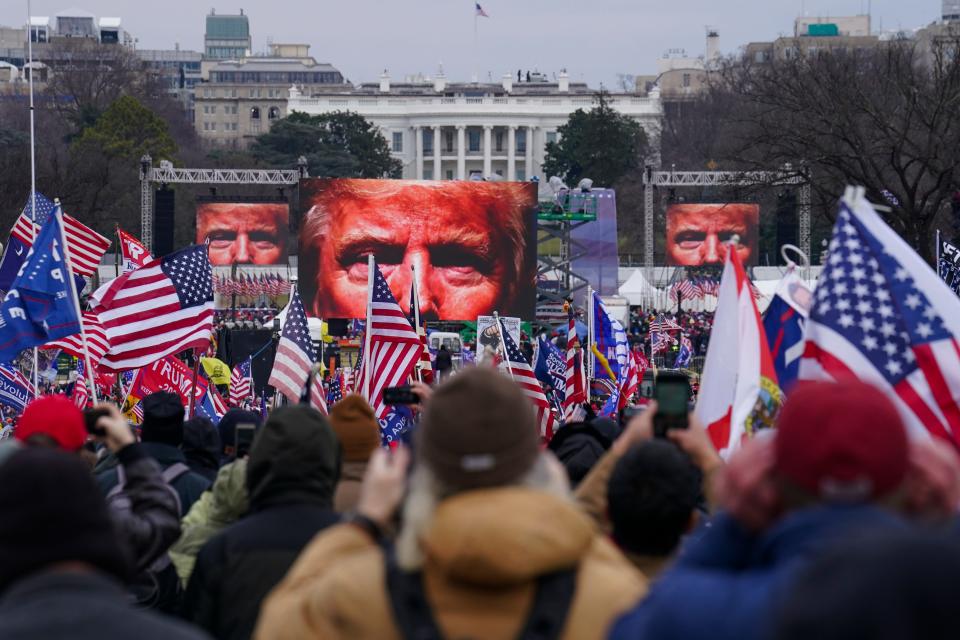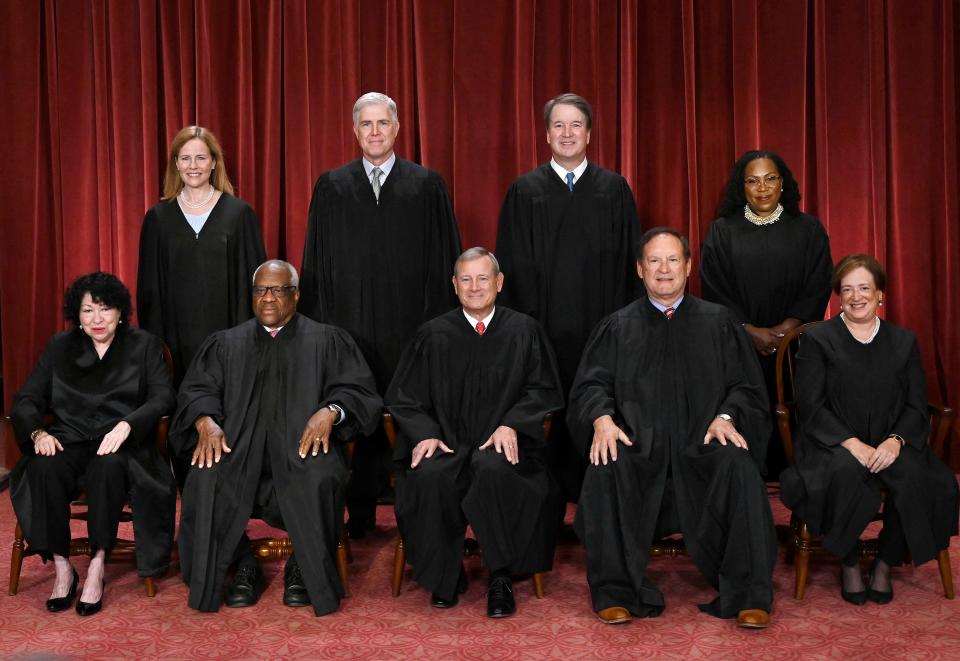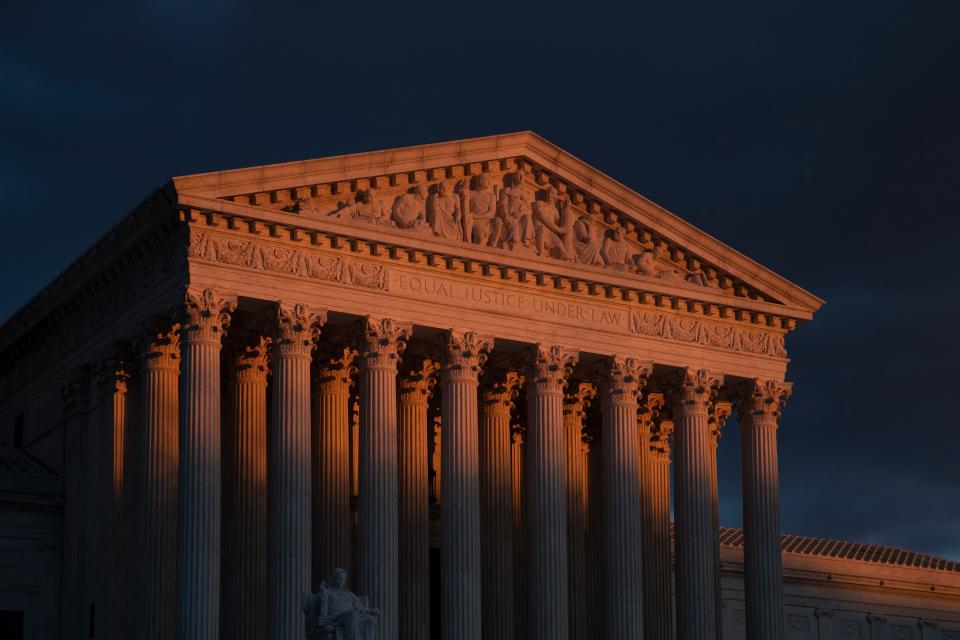Can the 14th amendment take Trump off the ballot? Supreme Court to hear case Thursday
- Oops!Something went wrong.Please try again later.
- Oops!Something went wrong.Please try again later.
WASHINGTON − The U.S. Supreme Court on Thursday will consider whether former President Donald Trump’s role in the Jan. 6, 2021, attack on the U.S. Capitol disqualifies him from the presidency.
The historic case could have huge consequences for this year’s election if the justices decide that Trump, the front-runner for the GOP nomination, is barred by the Constitution from returning to the White House.
It’s the biggest presidential election case since the Supreme Court decided Bush v. Gore in 2000, effectively confirming the election of George W. Bush.
It’s also a major test for the Supreme Court, which has been rocked by ethics scandals, criticism over its 2022 decision to overturn Roe v. Wade and low public approval ratings.
And it's not the only case about Trump the justices will be deciding. Trump is expected to appeal a lower court's ruling that he is not immune to criminal charges he tried to overturn the 2020 election.
Here’s what you need to know:
What is the court deciding?
The Supreme Court is deciding whether Colorado’s highest court was wrong to exclude Trump from Colorado’s primary ballot. The state court said Trump is disqualified under Section 3 of the 14th Amendment, an anti-insurrection provision added after the Civil War to keep government officials who sided with the Confederacy from returning to power.
It’s the first time the nation’s highest court will hear a case on Section 3.
What is Section 3 of the 14th Amendment?
The provision bars people who took an oath to support the Constitution from holding office again if they engaged in insurrection. The clause says:
"No person shall be a Senator or Representative in Congress, or elector of President and Vice-President, or hold any office, civil or military, under the United States, or under any State, who, having previously taken an oath, as a member of Congress, or as an officer of the United States, or as a member of any State legislature, or as an executive or judicial officer of any State, to support the Constitution of the United States, shall have engaged in insurrection or rebellion against the same, or given aid or comfort to the enemies thereof. But Congress may by a vote of two-thirds of each House, remove such disability."

Who is challenging Trump's eligibility?
Four Republican and two independent voters in Colorado sued to keep Trump off the state’s primary ballot. The voters include the lead plaintiff, Norma Anderson, a registered Republican. Anderson, 91, was the first female majority leader in both the Colorado House and Senate.
“Our state law allows us to take certain individuals, if they don’t qualify, off the ballot,” Anderson said in a video created by Citizens for Responsibility and Ethics in Washington (CREW), the watchdog group representing the voters.
How did Trump v. Anderson get to the Supreme Court?
After a five-day trial last fall, a Colorado district judge ruled that Trump had "engaged in an insurrection" by inciting the mob that stormed that U.S. Capitol. But the judge also concluded that Section 3 of the 14th Amendment does not apply to a president.
After the voters appealed, Colorado’s top court, in a 4-3 decision, said the provision does apply to the presidency and disqualifies Trump from holding the office again.
Where else has Trump been challenged?
Of the dozens of challenges to Trump filed around the country, the Colorado case is the only one that has succeeded in court so far. Maine’s secretary of state, a Democrat, ruled in December that Trump is ineligible for that state’s ballot. That decision, which Trump is appealing, is on hold until the Supreme Court rules in the Colorado case.
Has anyone else been recently barred from office because of Section 3?
A New Mexico judge last year disqualified county commissioner and Cowboys for Trump co-founder Couy Griffin from holding public office for engaging in insurrection at the U.S. Capitol on Jan. 6, 2021.
Griffin has appealed that decision to the Supreme Court.

What are Trump's arguments?
Trump’s main argument is Section 3 doesn’t apply to presidents. And even if it did, he did not “engage in insurrection.”
"There was no `insurrection,'" his lawyers wrote in a filing. "President Trump did not `incite' anything, and President Trump did not `engage in' anything that constitutes `insurrection.'"
Trump to Supreme Court: Calling himself `presumptive nominee,' Trump tells Supreme Court to keep him on the ballot
What are the Colorado voters' arguments?
Lawyers for the other side say it defies common sense to think the amendment authors wanted to protect the Constitution from every oath-breaking insurrectionist except the person who holds the highest office in the land.
“By intentionally inciting a violent attack on the Capitol to cling to power,” they wrote, “Trump `engaged in insurrection’ against the Constitution.”
Challengers' argument: Don't give Trump the power to unleash more `mayhem,' Colorado voters tell Supreme Court
How can I listen to the arguments?
The court is scheduled to debate Trump v. Anderson at 10 a.m. EST Thursday. The allotted time is 80 minutes but is expected to run much longer. Audio is available through the court’s website: www.supremecourt.gov.

Will Trump be there?
Trump is not scheduled to attend. The oral arguments are the same day as the Nevada caucuses, and Trump is expected to be in the state that night.
Who will be arguing for Trump?
Trump’s lead attorney is Jonathan Mitchell, a former solicitor general of Texas who helped create the state’s six-week abortion ban that put enforcement in the hands of private citizens. He clerked for former Justice Antonin Scalia and has argued five cases before the Supreme Court.
Who will be arguing for the Colorado voters?
Jason Murray, a Colorado trial lawyer, will be making his first Supreme Court argument when he represents the Colorado voters Thursday. Murray clerked for Justice Elena Kagan on the Supreme Court and for Justice Neil Gorsuch when he was on the Denver-based 10th U.S. Circuit Court of Appeals.

Will anyone else be arguing?
Colorado’s solicitor general, Shannon Stevenson, was granted 10 minutes to represent Colorado Secretary of State Jena Griswold.
The case began when Griswold was sued by the six voters seeking a court order to keep her from certifying Trump’s place on the ballot. Griswold asked for time before the justices because, she said, Trump’s appeal affects her ability to interpret and enforce Colorado’s election laws.
What is the Biden administration's view?
The Department of Justice has not weighed in on this case. And, unlike in other high-profile cases involving federal issues, the Supreme Court did not ask for the executive branch’s views.
As for Biden, he’s said there’s “no question” that Trump “supported an insurrection.”
“Now, whether the 14th Amendment applies,” Biden said in December. “I’ll let the court make that decision.”
When will the Supreme Court make a decision?
The court has no deadline. The justices have been urged to settle the issue before more voters go to the polls. Colorado’s and Maine’s primaries are March 5, otherwise known as Super Tuesday, when more than a dozen states will hold primary elections.
"So much winning?" Donald Trump remade the Supreme Court. It hasn't always made him a winner
This article originally appeared on USA TODAY: Supreme Court to hear Trump ballot case Thursday in historic first

